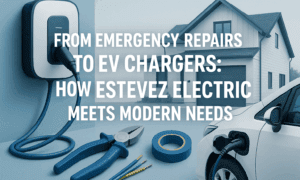Introduction
In recent years, the automotive industry has been experiencing a revolution, and at the heart of this transformation lies the Electric Vehicle (EV). With the growing concerns about climate change and the need for sustainable transportation, EVs have emerged as a compelling solution. However, one critical aspect of the EV ecosystem that often goes overlooked is the EV charger. In this article, we will delve into the world of Smart EV chargers, exploring their types, benefits, and their pivotal role in the transition to a greener future.
The Rise of Electric Vehicles
The automotive landscape is evolving rapidly, with electric vehicles leading the way. As concerns about fossil fuel emissions and environmental sustainability have gained momentum, major automakers have invested heavily in developing electric cars. Tesla, Nissan, Chevrolet, and BMW are just a few of the manufacturers offering a range of EV models. The rise of EVs can be attributed to their numerous advantages, including reduced emissions, lower operating costs, and a quieter, smoother ride.
The Key to Going Electric: Smart EV Chargers
While electric vehicles themselves have garnered significant attention, EV chargers are equally vital components of the Smart EV ecosystem. These chargers are the lifeline that allows EV owners to keep their vehicles powered up and on the road. Let’s explore the various aspects of EV chargers.
Types of EV Chargers
EV chargers come in various types, catering to different needs and charging speeds:
- Level 1 Chargers: These are the most basic and commonly found chargers. Level 1 chargers use a standard 120-volt household outlet and provide the slowest charging speed. They are typically used for overnight charging and are suitable for EVs with smaller battery capacities.
- Level 2 Chargers: Level 2 chargers require a 240-volt power source, similar to what you’d find for a large appliance like a dryer. They offer faster charging rates, making them a more practical choice for many EV owners. Level 2 chargers can charge an EV up to several times faster than a Level 1 charger, making them suitable for daily charging needs.
- DC Fast Chargers: DC (Direct Current) fast chargers are the quickest option available for charging an electric vehicle. These chargers can provide a significant charge in a matter of minutes, making them ideal for long-distance travel and public charging stations. However, they require a specialized infrastructure and are less common compared to Level 1 and Level 2 chargers.
Benefits of EV Chargers
- Convenience: Smart EV chargers offer the convenience of refueling your vehicle at home or in public places. With Level 2 chargers, you can significantly reduce the time it takes to charge your EV, making it more convenient for daily use.
- Cost Savings: Charging an EV at home with a Level 2 charger



































